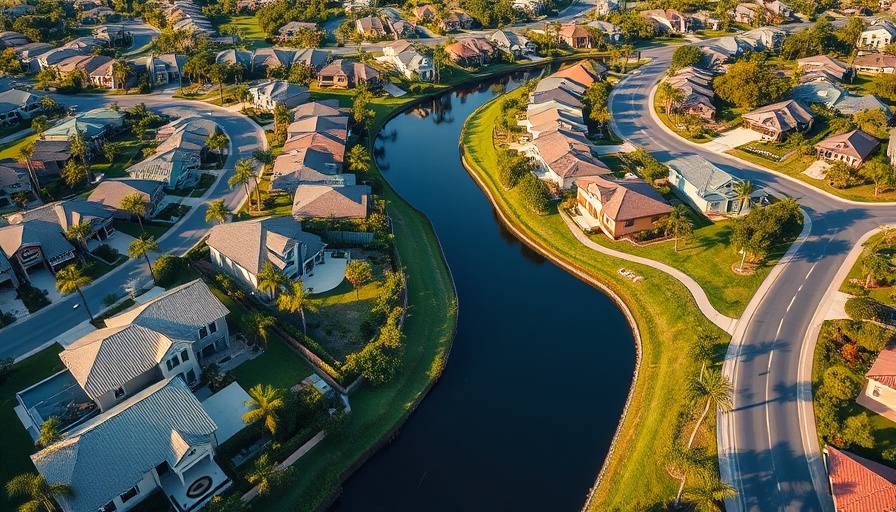
Florida's Construction Boom: An Unforeseen Crisis
As the sun-kissed state of Florida rises as a hub for new home construction, an unsettling truth lurks beneath the surface. While Florida is recognized for producing a staggering volume of new builds, the reality is that new homes are not impervious to hidden problems—some of which could cost homeowners dearly down the line. This article dives into the factors contributing to Florida's construction crisis and what potential homeowners need to know to protect their investments.
In 'Hidden problems in new homes as Florida construction booms', the discussion reveals significant defects in Florida's booming housing sector, prompting us to explore underlying issues and how to safeguard homeowners.
The Disquieting Reality of New Homes
Reports reveal alarming statistics: a recent study shows that Florida ranks among the top states for high volume new construction. However, hidden defects are a growing concern for buyers. Renowned structural engineer Tom Miller sheds light on dire cases, including severe water intrusion and structural failures. These hidden issues often remain unnoticed until critical systems fail, years after home warranties expire, leading to significant financial burden for homeowners.
Cases of extensive damage have emerged, such as the Edge Townhomes in South Tampa, where shoddily constructed homes were on the brink of collapse. Such instances indicate a systemic problem rather than isolated incidents. Homeowners are left to grapple with the implications of poor construction practices, rushing builders, and insufficient regulatory oversight.
Legislation Favoring Builders Over Homeowners
Compounding these issues is the passage of Senate Bill 360 in 2023, which reduces the construction defects claim period from ten years to seven. This legislation has raised eyebrows among consumer advocates, with Tampa insurance attorney Dave Murray contending that it disproportionately favors builders at the expense of homeowners. With homeowners’ largest asset at stake, the urgency for adequate consumer protection is more critical than ever.
Understanding Your Rights: The Importance of Due Diligence
New homeowners must be proactive. Experts like Murray emphasize the necessity of hiring independent inspectors with proven expertise in building codes before making a purchase. These professionals can identify potential problems before they escalate, shielding homeowners from the financial repercussions of latent defects.
Additionally, homeowners facing construction defects may find themselves negotiating with builders through non-disclosure agreements (NDAs). Though slightly alarming, NDAs often shield builders from accountability, further complicating the resolution process. The increasing prevalence of this practice stifles public awareness of broader construction issues, which could drastically inform potential buyers' decisions.
Raising Awareness: The Societal Impact of Poor Construction
The ramifications of a faulty home construction crisis extend beyond the individual homeowner; they affect communities at large. As more families find themselves embroiled in lengthy legal battles, the social fabric is strained by a series of broken dreams and financial uncertainty. Thus, it becomes imperative for communities to engage local lawmakers and demand greater oversight of construction practices.
Finding a way forward is crucial. As communities deal with a construction crisis, informed homeowners are empowered to advocate for transparency and quality in housing development. This might mean confronting builders and holding them accountable for their work, facilitating a demand for better practices across the industry.
A Call for Action: What Can Be Done?
Conversations around these issues must include local perspectives as well as legislative action aimed at reforming realtor and builder practices. As construction defects lawsuits continue to rise, unprecedented scrutiny on builders could lead to safer, more reliable homes. Residents, community advocates, and homeowners alike need to rally around the cause for changing how new homes are built and enforced.
Homeowners also have a role to play. By filing complaints with the appropriate authorities when defects arise, they can help build a case for stricter regulations and oversight. The pathway to safety in new construction is paved with organized advocacy and vigilance—it’s time for people to stand up for their homes.
In conclusion, the changing landscape of Florida's housing market requires a collective effort to raise awareness and enforce accountability. As evidenced by the cases shared within this article, staying informed and proactive is essential to safeguarding the most significant investment many will make in their lives: their homes.
 Add Row
Add Row  Add
Add 






Write A Comment